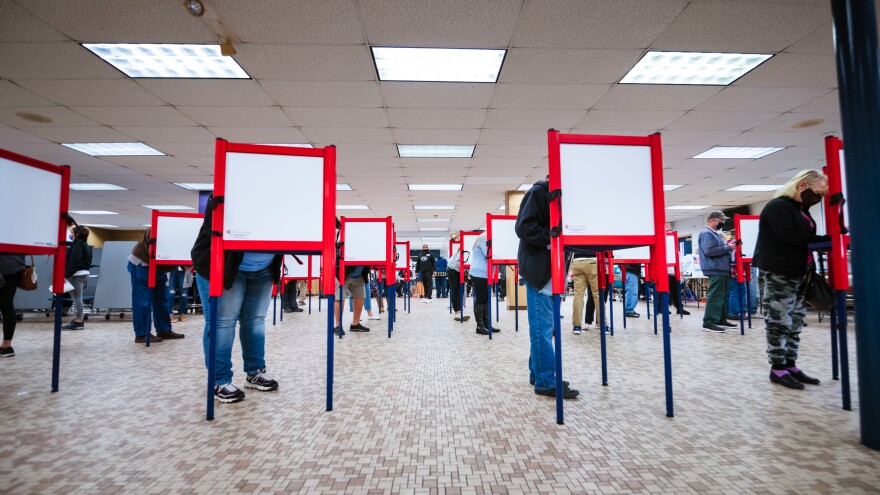In states such as Georgia and Arizona, there are fierce partisan battles going on right now over voting proposals. But in Kentucky's Republican-led legislature, a bill to boost voter access and election security has gotten widespread support from both parties.
The legislation is now at the Senate after passing the House 93-4 late last month.
The proposal would preserve some of the policies Kentucky implemented last year to ensure voter access during the coronavirus pandemic, including a short period during which people can vote early, and allowing people to "cure" mail-in ballots that were improperly signed.
But it also includes election integrity measures typically favored by Republicans, like a ban on so-called ballot harvesting and making it easier to remove people who have moved out of Kentucky from the state's voter rolls.
The Republican secretary of state, Michael Adams, said the bill made him proud to be a Kentuckian.
"In many other states right now, legislatures are debating restricting access of their voters to the ballot. Not here in Kentucky," Adams told lawmakers. "What you all are debating today, and hopefully considering, is actually making it easier for our voters to vote."
Kentucky Republicans could pass an election reform bill without Democrats. The GOP controls three-quarters of the seats in the legislature.
But Democrats are lining up in support of the legislation.
State Rep. Buddy Wheatley was one of 25 Democrats who voted in favor of the bill in the House. He said last year's election showed that voting can be different.
"The things that were so positive about the COVID, or the 2020 election, helped create the mindset that we all don't just vote on Election Day; there are other options," Wheatley said.
Before the pandemic, Kentucky had some of the most restrictive election laws in the country. The state allowed people to cast ballots early or by mail only if they had an excuse — like a medical condition, or if they temporarily reside outside their home county.
But last year, Democratic Gov. Andy Beshear and the Republican Adams temporarily changed that, to try to reduce crowds on Election Day.
For the first time ever, every Kentucky voter could vote by mail or vote early if they were concerned about contracting the virus, and it led to record-high voter turnout.
That left lawmakers wondering if they should keep the temporary provisions for which there was consensus.
Republican state Rep. Jennifer Decker is the main sponsor of the bill moving through the legislature. She says the dollar cost of expanding some access is worth it.
"We understand that we have got to have the fairest and freest election we can put together," she said.
Decker's bill would create three days of early voting across the state and allow people to fix their signatures if they signed their mail-in ballot incorrectly.
And though voters would once again have to have an excuse to vote by mail, they would be able to request their ballots through an online portal instead of through their local county clerks.
The bill would also allow counties to create "vote centers" where any registered voter in the county could cast a ballot; let absentee voters submit their votes in drop boxes; and allow clerks to start counting ballots 14 days ahead of Election Day.
"We need to go further"
Sadiqa Reynolds, president of the Louisville Urban League, said she is encouraged by the legislation, but disappointed it would allow for only three days of early voting.
"We support continuing absentee ballots so that is good, but it makes it harder when you revert to a limited number of exemptions," Reynolds said in a statement. "Kentuckians will be better off when we stop comparing ourselves to ourselves. For example Portland, Oregon allows everyone to vote by mail. We have taken some steps and we need to go further."
Similarly, University of Kentucky law professor Joshua Douglas says the bill is a "mild expansion" of voting in the state and that he wishes it did more, like keeping the expansion of mail-in voting.
"It's not the bill I would have written," Douglas said. "It doesn't have everything I want. But it has a lot of things I like and not a ton of things I hate."
Douglas says the bill is an example of how compromise can still work in the political process.
"It doesn't have to devolve into partisan squabbles if we all come together with one common idea in mind, which is having a robust, inclusive and secure democracy," he said. "And all those things are possible; it's not mutually exclusive."
It's not the only election bill lawmakers have considered. Earlier this year, the legislature passed a bill stripping the governor and secretary of state of their power to change election procedures during states of emergency. That means the legislature will decide how elections proceed during any future emergencies.
Copyright 2021 Louisville Public Media



